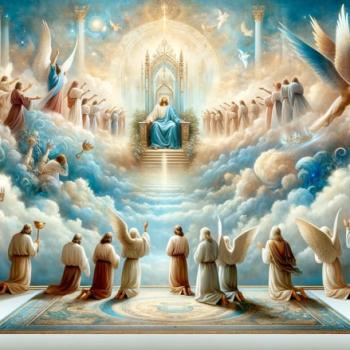
Theology serves a crucial purpose. It steers us back time and again to the heart of God. It informs us of Whom we worship and provides a structural understanding of the faith we hold to.
In my opinion, theology is often employed in a less laudable endeavour – to reinforce the status quo. For example, I was brought up in a church which regularly taught on ‘wilderness times’ – periods in the life of a believer when God seems absent or distant, when prayers seem to bounce back from brassy skies, when spiritual dissatisfaction and drought is normal and divine encounters either rare or non-existent. The emphasis of this teaching is that we all experience such times (and therefore they must be part of the life of faith), and that we ought to just plod on in the intellectual knowledge that God is never truly absent, and that things will change when we enter a new ‘season’.
I’ll cut straight to the chase. This is unbiblical. We are promised so much in Christ – rich blessings to enjoy in this life, on this Earth as well as in the life to come. The function of this teaching is to lower the believer’s expectations and justify the status quo, but to grow in the knowledge of God we first have to shake this nonsense off. I did. At the age of 19 I got serious with God, asking for rich intimacy with him instead of boredom and routine, and boy did he give me exactly what I’d asked for. It took work to get myself ready for the flood, but God is faithful to his promise and gives the Holy Spirit to those who ask.
Look at Paul’s language in his prayer of Ephesians 3:17-19,
‘And I pray that you, being rooted and established in love, may have power, together with all the Lord’ holy people, to grasp how wide and long and high and deep is the love of Christ, and to know this love that surpasses knowledge – that you may be filled to the measure of all the fullness of God.’
This is not mealy-mouthed talk of wilderness times and brassy skies. Unlike much modern Evangelical teaching, it is exultant, ambitious, and aspiring to extraordinary spiritual fullness – filled to the measure of the fullness of God through a mystical understanding of love.
I believe that there has been a watering down of God’s promises in the Evangelical movement, explaining away the extraordinary words of Jesus and the New Testament writers in preference for something entirely more staid, predictable, and constitutionally dissatisfying.
The church I grew up in spoke more of unanswered prayer than answered prayer, of ‘plodding on’ instead of soaring on wings like eagles, and lack of spiritual experience over seeking to connect with God in a tangible way. These teachings, when bundled up together, serve as apologetics for the status quo, when in fact we should be asking how we got so lost.
Experience has taught me that this often happens. Our theology, instead of being shaped by the teachings of the Bible, is framed instead to match our experience. I’ve noticed a pattern:
- Churches that de-emphasise the gifts of the Spirit rarely move in the gifts of the Spirit.
- Churches that have forgotten the importance of miraculous healing to Jesus rarely see any miraculous healings. They might pray for them, but the healings won’t come.
- Churches that focus on unanswered prayer don’t get their prayers answered.
- Churches that talk about ‘plodding-on’ as if that were God’s intended daily experience for the life of the believer, rarely experience joy, breakthrough, or victory.
We literally build in blocks to God’s promised activity in our lives and call it theology. We need to take God seriously, believe his promises, and seek a far deeper relationship with the Holy Spirit, collectively and individually. I firmly believe that large swathes of the Evangelical movement are in disobedience to God and his word, living half or quarter lives when they should be shining like cities on a hill.
Revival means to bring back to life, the implication being that we, the subject, are dead. Not struggling or in need of restoration; dead. I have come to believe that is the state every church that de-emphasises the work of the Holy Spirit finds themselves in, and that we are in need of CPR, a defibrillator, and perhaps a shot of adrenaline to the heart. Lord, have mercy, and bring revival.












